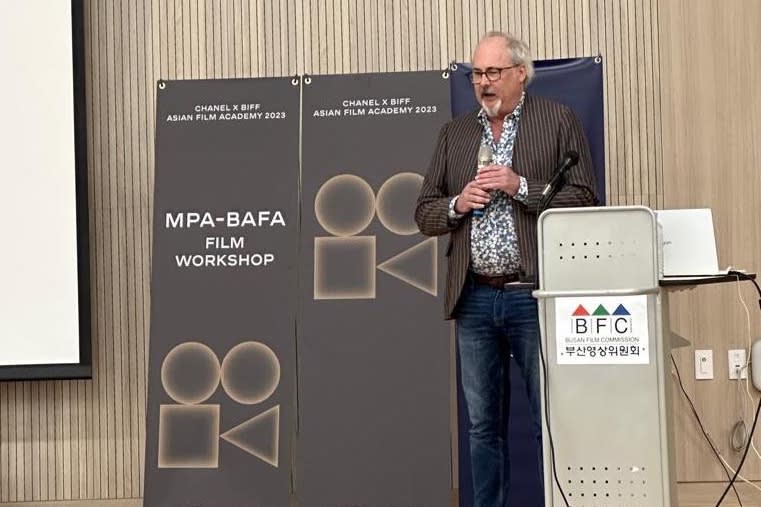Japan & Korea Set To Become Asia’s Next Offshore Production Hotspots, Says ‘Mortal Kombat’ & ‘Meg 2: The Trench’ Producer E. Bennett Walsh — Busan

U.S. producer E. Bennett Walsh, who has made films including Mortal Kombat, Meg 2: The Trench and The Kite Runner across the APAC region, says he’s got his eye on Japan and Korea as the next hot destinations for footloose Hollywood productions.
“I think the opportunity in Asia is in Korea and Japan,” said Walsh. “Tokyo Vice recently had a great experience in Japan and there are more opportunities for productions like that. Some pieces of the Marvel movies have filmed in Korea, but that was just scratching the surface.”
More from Deadline
Hsueh Shih-Ling, Angga Yunanda Among Cast Revealed For Ambitious Co-Production 'Malice' - Busan
Philippines Increases Film Location Incentive To 25% With Addition Of Cultural Bonus - Busan
Japan recently introduced an official production incentive to fund up to one half of the qualifying Japanese spend of international productions, while Korea has been operating incentives for several years. In addition, Japan’s largest studio Toho recently formed a joint venture production services outfit with established Japan-based producer Georgina Pope (Equals, Giri/Haji).
“The opportunities in Japan have been under-estimated – the crew base is developing, and the language barrier is changing. Everything is becoming more accessible because of the [Tokyo 2020] Olympics,” Walsh said.

Walsh was speaking at the MPA Chanel X BAFA Film Workshop, organized by the Motion Picture Association (MPA) and BIFF Asian Film Academy (BAFA), at the on-going Busan International Film Festival.
Walsh added that Thailand remains the major offshore production hotspot in Asia, with Malaysia playing catch-up with it incentives and studios. “Hollywood has been shooting Thailand for 30 years, so the crews are incredibly skilled. Malaysia is probably the biggest competition for Thailand in Southeast Asia.”
He said the reason he was free to attend the festival is that Mortal Kombat 2, which should have been shooting in Australia, has been on hold since mid-July due to the SAG-AFTRA strikes. However, he was optimistic that an agreement would be reached soon, and the production could start up again.
He acknowledged that China, where he filmed Kill Bill, The Kite Runner and Zhang Yimou’s The Great Wall, is a bit trickier these days due to regulations and increasing costs as the domestic industry booms. Kill Bill: Volume 1 filmed at Beijing Film Studios in 2002 at the very beginning of the Chinese film industry’s spectacular growth trajectory, at a time when the country was just starting to build multiplexes and open up to international productions.
“Having gone back to China again and again, it’s been a real treat to see the industry grow from nothing to what it’s become today,” said Walsh. On the opportunity for future China-US co-productions he said: “It’s a case of finding the right stories. I’ve always been in awe of the way the Chinese film industry has grown.”
Walsh also recently filmed China-US co-production Meg 2: The Trench in the UK and Thailand but said the decision to not film in China was wholly due to Covid restrictions.
He described The Kite Runner as his “hardest movie ever” because the production had to go to Afghanistan to cast for three months, then get all the cast out of that country and into Kashgar in the far West of China, where the film was partly shot.
“After doing 25 movies I can solve anything – not because of ego but just because I’ve had to get on with it. There are some things I have to sleep on, but I can always get it done.”
The MPA Chanel X BAFA Film Workshop also organized a pitching competition for Asian filmmakers, which awarded its Grand Prize to Lebanese director Pascale Asmar for Tamima. The prize comes with a trip to Los Angeles to participate in the Global Film & Television Immersion Course. The President’s Special Recognition Prize was awarded to Vietnam’s Nguyen Phan Linh Dan for If Wood Could Cry, It Would Cry Blood.
The pitch competition judges said: “Tamima is a powerful tale that reflects the turbulence of current times and the powerful forces that shape our identity. Pascale Asmar made a passionate and accomplished presentation that gave the judges confidence that the filmmakers would bring this project to fruition.”
They praised If Wood Could Cry, It Would Cry Blood as a “thoughtful and deeply layered film about childhood trauma, beautifully developed and realized through Nguyen Phan Linh Dan’s presentation. The filmmaker is thoroughly in control of her medium and her participation at the Asia Pacific Screen Awards should open further doors for this stunning feature film project.”
Best of Deadline
2023 Premiere Dates For New & Returning Series On Broadcast, Cable & Streaming
SAG-AFTRA Interim Agreements: Full List Of Movies And TV Series
Sign up for Deadline's Newsletter. For the latest news, follow us on Facebook, Twitter, and Instagram.


